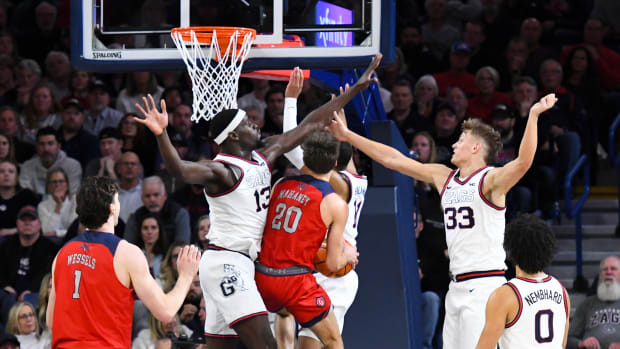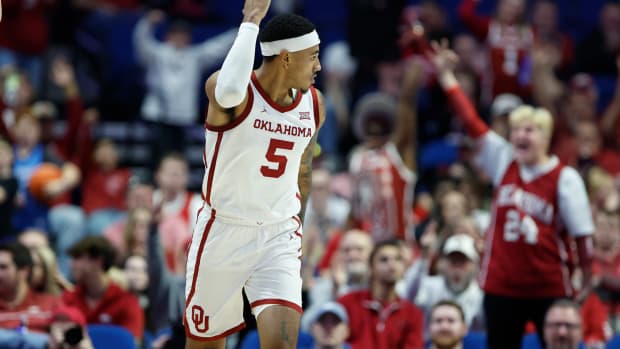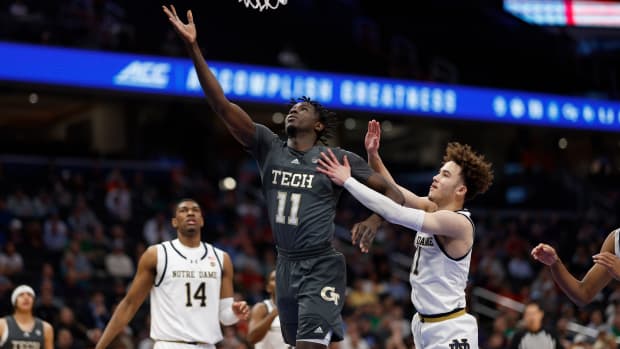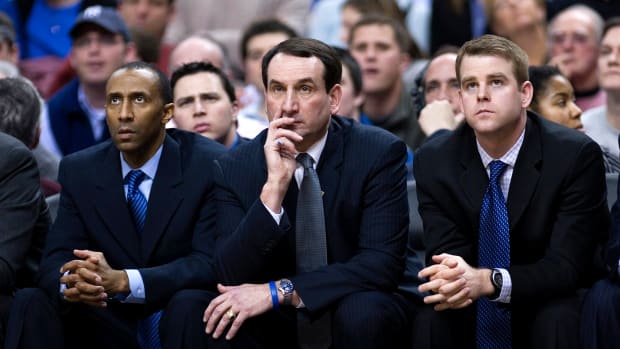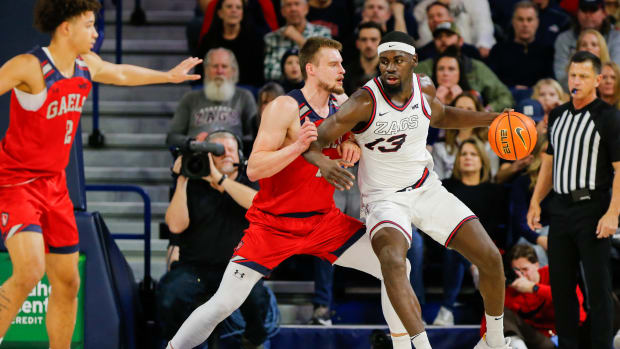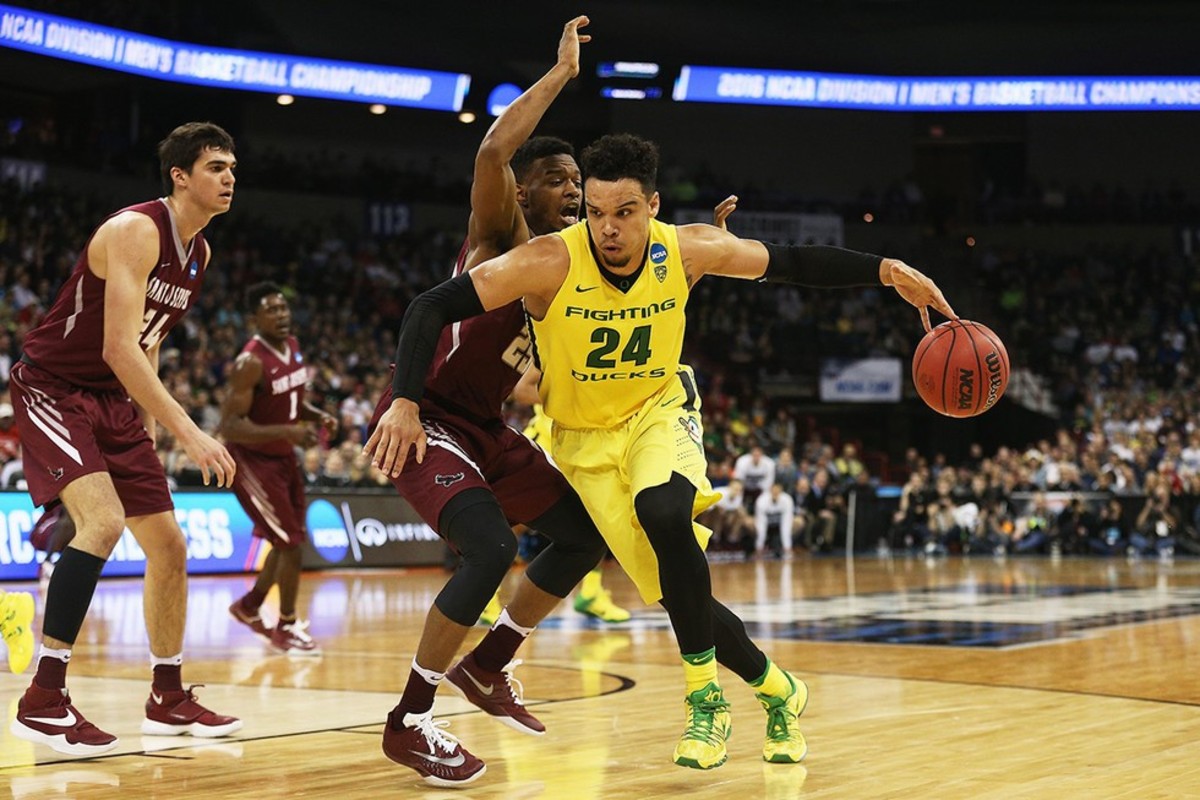
Dillon Brooks muscled his way to Oregon and now wants to lead the Ducks to first Final Four since 1939
ANAHEIM, Calif. — As Oregon's Dillon Brooks outmuscled Saint Joseph's in the NCAA tournament last weekend, he invaded personal space on defense, dunked like the rim had offended him and played as if powered by caffeine instead of oxygen. He looked less like a sophomore forward and more like a derecho clad in a highlighter-yellow jersey.
His youth coach, Tony McIntyre, who co-founded CIA Bounce in Toronto, is familiar with the Dillon Brooks Intensity Tour. When Brooks was in sixth grade, he played with an aggression that bordered on being unhealthy, accumulating fouls and often losing his composure. His angry play continued into high school. "He didn't know how to channel it," McIntyre says.
When Brooks arrived at Findlay Prep, the powerhouse high school program just outside of Las Vegas, he was intent on becoming less of a hothead. What helped him, besides just getting older, was not playing. Brooks roomed with future NBA players Rashad Vaughn and Kelly Oubre, and he played less than he would have liked. But instead of sulking, he honed his game at practice and in late-night or early-morning workouts. Now, McIntyre says, Brooks is "an exotic sports car that's stuck in fifth gear," as intense as ever but more controlled.
St. Joe's saw that on Sunday, as Oregon ended the game with an 18–6 run that Brooks started with a layup. He put Oregon in front, 64–62, with a three-pointer from the right wing that prompted a furious round of air guitar from his teammates on the bench. He later forced a turnover with nine seconds left and finished with 25 points and harassed junior forward DeAndre Bembry, an NBA prospect and the Atlantic 10 Player of the Year, into 16 points on 5 of 15 shooting.
That victory moved Oregon into the Sweet 16, where it faces Duke on Thursday in the West regional. Brooks will try to do Dillon Brooks-type things, will try and prod and bully, will seek to discomfort. He led Oregon in scoring this season, averaging 16.8 points, 5.7 rebounds and 3.1 assists. Teammates invariably describe him with one word, with that word—intense.
That's how he made it this far, though. Through willpower and stubbornness. After the Ducks fell to Wisconsin in the second round of the tournament last season, Brooks had what Oregon assistant coach Mike Mennenga calls "a stress reaction in one foot." The injury forced Brooks to rest for more than two months. That went about as well as could be expected for a player whose hobby is practicing his craft. "That," Mennenga says, "was the toughest thing he's ever done."
Brooks sought other means of self-improvement. He altered his diet, adding vegetables, eating more protein and avoiding carbs, and the result was a sculpted 6'7", 225-pound frame. "I saw him last year when he first got here, and I was like, uh, I don't know about this guy,'" says Fred Jones, a former Oregon star who is now an undergraduate assistant. "Now, he's our MVP."
He continues: "Growing up in Canada, he always felt looked over, always felt like he had something to prove."
Brooks grew up in Mississauga, Ontario, about 35 minutes from Toronto. His father worked construction. His mother directed projects at a Canadian bank. Brooks was taller, but pudgy then, and he struggled with a learning disability.
Early into his basketball career, he encountered the stereotypes of Canadian basketball players—mostly, that they were soft. He wanted to be the opposite, and perhaps he overcompensated. His game had no softness, and also no subtlety.
CIA Bounce was created in 2006, and the story is so crazy it sounds too good to be true. It involves Mike George, then an eighth-grade teacher at Cardinal Newman Catholic School in Brampton, Ontario, and some luck. He had applied to appear on the television show Deal or No Deal in 2007 because he needed money for his grassroots hoops program, Characteristics Inspiring Achievement, CIA for short.
George had merged his team with the one coached by his chief rival, McIntyre. Then George was selected for the game show, where he picked suitcases based on the jersey numbers of his favorite NBA players—like 1 for Chris Bosh and 3 for Dwyane Wade. George won $144,000, half of which he designated to CIA Bounce.
The influx of cash helped pay for uniforms, shoes and other equipment. It helped the coaches charter buses for road trips to tournaments and pay for entry fees. George says he felt even then like his team had NBA-caliber talent but "didn't really have the exposure or mentality." McIntyre didn't feel as strongly, but he hoped that George was right. "Honestly, when we started, I'm being really truthful here, our goal was to get one kid a scholarship," McIntyre says.
It worked out pretty well. The Cavaliers drafted forward Tristan Thompson in 2011. Two other CIA Bounce products, Anthony Bennett and Andrew Wiggins, went first overall in 2013 and '14 after playing at UNLV and Kansas, respectively. Tyler Ennis (Syracuse) was selected in the first round of the '14 draft. Meanwhile, McIntyre estimates that more than 70 players from his program have obtained college scholarships since the merger.
Getty Images file
One of them, of course, was Brooks, a player Canada tabbed last summer for its senior national team in the Pan American Games. He starred alongside Jamal Murray, Kentucky's All-SEC shooting guard and a projected NBA lottery pick as well as yet another Bounce product. The Canadians finished second and toppled the U.S. in the semifinals—and this from a country whose NBA team, the Raptors, debuted in 1995, one year before Brooks was born. "If we could qualify for the Olympics, we could medal in 2020," McIntyre says. "At that point, we'll be cutting NBA players off the national team."
Oregon has three Canadian players on its roster—Brooks, injured guard Dylan Ennis (also of CIA Bounce) and Chris Boucher, a wily senior forward from Montreal. McIntyre says he liked Oregon for Brooks in particular because coach Dana Altman has the opposite personality of his star forward—he's calm, measured, relaxed. "I also felt with his body, how physical he is, that he would be more dominant in the Pac-12 than other conferences," McIntyre says. "I thought he would stick out as something different."
He has. Brooks defends centers and point guards. He drives and dishes and dunks. He plays outside and in. "Versatility kills," McKenna says. "And he might be our most versatile player." Brooks made first-team All-Pac-12.
Oregon is the final team from its conference remaining in a tournament that started with seven schools from the Pac-12. The Ducks have won two games, Utah won its first-round matchup and the other five lost their tournament openers. The last Pac-12 school that made a Final Four was UCLA, which capped a three-year streak of getting at least that far under then coach Ben Howland in 2008. In the past 50 years, the only conference school besides UCLA and Arizona to advance to the national semifinals was Stanford in 1998. Oregon's only Final Fourth berth came in 1939, the tournament's inaugural year, when the Ducks won the eight-team tournament for their only national championship.
The Ducks have since lost four times in the Elite Eight, including in 2002, when they were a No. 2 seed that was the school's highest ever until getting a No. 1 this year. Jones, their undergraduate assistant, starred on that '02 team alongside Luke Ridnour and Luke Jackson—three future pros. That Oregon squad was star-heavy but not as balanced as the current one, and it lost one game short of the Final Four to a top-seeded Kansas team. Brooks says Jones talks about that run so much that it registers as a kind of annoying motivation. He wants to top it. "We've made so much history," he says. "Why stop now?"
To that end, Brooks spoke to McIntyre earlier this week. His coach asked Brooks if he had thought at all about the NBA, or anything beyond this tournament. "I don't want to talk about it," Brooks told him, his trademark intensity evident even over the phone. "I don't want to think about. All I want is to win a national championship."

